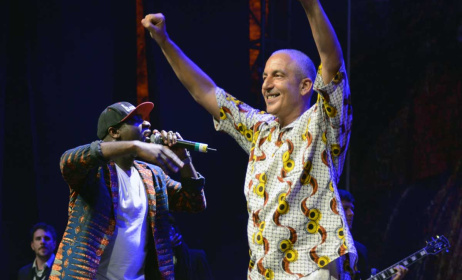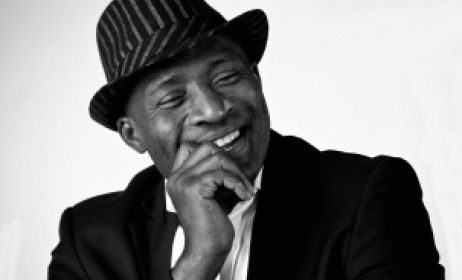Asia Madani: Leaving Sudan was the best thing for my career
Asia Madani has been singing since she was nine. Eighteen years ago, she got her lucky break when she left Sudan for Egypt's capital Cairo, a leading cultural hub for Arab-speaking musicians.
 Asia Madani performing at the 2019 edition of Sauti za Busara.
Asia Madani performing at the 2019 edition of Sauti za Busara.
Madani attributes her success to Egypt’s thriving music scene, which exposed her to a wealth of musical styles. This also led her to fusing different Arabic musical cultures with Sudanese folk.
Fast forward to 2019 and Madani is astonished by her success. She has toured the world with initiatives such as AfriCairo and the Nile Project, and last month she performed at the 2019 edition of Zanzibar's Sauti za Busara, where she spoke to Music In Africa about collaborating with other African musicians, the reasons she decided to leave her home country and powerful women in music.
MUSIC IN AFRICA: The music industry is Sudan is struggling due to many contributing factors. What is the biggest challenge?
ASIA MADANI: The biggest concern, not just for me but also for my fellow musicians, is that the government oppresses self-expression. Artists cannot sing or talk freely about sensitive issues in the country. For those who are scared, they change their music, but those who know their responsibility as artists and cannot change their music stand such oppression or move out of the country.
Is this why most successful Sudanese musicians like yourself choose to work outside Sudan?
Absolutely. I know that if I were to remain in Sudan, it would have been challenging for me to make music. There are so many limitations apart from oppression that prevent the cultural sector from growing. In my case, when the government started to suffocate my work, I left the country, and that made me more popular.
What are some of those limitations?
For example, we do not have spaces for concerts and festivals that would bring musicians together. The government has not invested in such areas, making it difficult for artists to meet and sing, mentor others, conduct workshops, and so on. For me, leaving Sudan was great for my career. Egypt was the gate where I could have spaces, stages and momentum to grow my music without being oppressed.
Yet last year Egypt was ranked as the world's leading country of artistic rights violations against women. What are your observations as a female musician living and working in Egypt?
I am yet to experience it but I see it happening to Egyptian musicians. Maybe I haven’t gone through this because firstly I am an immigrant and secondly I am cautious of what I sing about. There are very sensitive topics that I do not touch on, such as local politics. What I do is speak about the situation in Sudan rather than get involved with the politics in Egypt.
Is a certain degree of music censorship necessary?
Music censorship is important. I believe music is about educating people and healing people. Therefore, if you do not use music as an instrument to change yourself and encourage people to be resilient with their life, then you are lost.
I sing for children, women, the youth and immigrants. Therefore, there are sensitive topics that are good for their development or healing. If your music brings or encourages chaos or is misleading people, then it shouldn't be accessible. When I decided to be a musician, my focus was to sing for people, make them happy and dance. I also wanted to be famous [laughs].
How was your experience at Sauti za Busara 2019?
I'm very proud of my experience and I can never be appreciative enough to the organisers for making this happen. First of all, this was my first time in Tanzania. I felt like I was home because even though I was meeting the musicians for the first time, it never felt different. We immediately connected and that was important to me because it is never easy to fit in with a new audience.
How did you find out about the Sauti za Busara and what was your favourite moment?
I came across a link to apply, and so I did. For me, the Swahili Encounters sessions and the final concert with all the participants was the best moment. As I said, it is never easy to work with artists from different cultures, but in this case we made it happen. We worked together and in just four days we put on a great performance. I'm proud to say that the experience will remain with me for ever. Whoever said music connects people was right.
Is there a possibility for further collaborations after Sauti za Busara?
I'm more than ready to move forward with any musician. I have taken advantage of my visit here to build networks and a contacts list, and so I am willing to work whenever the opportunity presents itself.
The organisers of Sauti za Busara say that very few women apply to perform at the festival. Why do you think this is so?
I have seen very talented women here at the festival, such as Siti Amina, and it was a wonderful experience working with her. Generally, conditions that make it difficult for women to make music vary depending on the country. I do not want to lay any blame. But I urge all women out there to lead and fight for their space. If they are scared of music, then they cannot represent others. We are at a time when women are taking over different sectors. We are in engineering and we are pilots, so why not music? I am the leader of my band and the only woman. I make all the decisions, and we work well. So anyone can do it.



























Commentaires
s'identifier or register to post comments